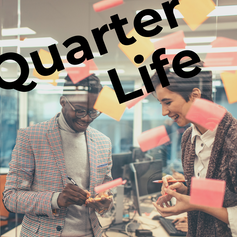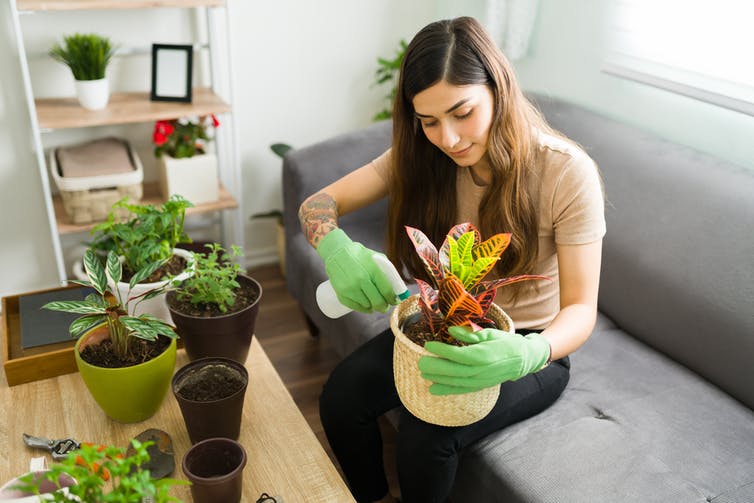
For those of us without access to outside green space, houseplants are a stylish and affordable way of getting a nature fix. Alongside looking nice, indoor plants actually have several other perks – the biggest benefit of which could be improving your mental health. And the good news is you don’t need to be a self-professed “plant parent” to experience these benefits either.
One in eight UK households don’t have access to any kind of garden. Young people and those from minority ethnic backgrounds are among those least likely to have a garden.
Not having access to nature can have a number of effects on our health. It’s been linked to symptoms of depression and anxiety, as well as other health conditions, such as asthma, cardiovascular disease, and poor immune function. For many of us, houseplants are an essential link to nature.
While there’s not yet a robust body of research on the mental health benefits of houseplants specifically, plenty of studies have shown how beneficial green space and gardening are for mental health. For instance, one study found that people who garden daily have better wellbeing and lower stress levels compared to those who don’t.
Gardening also reduces symptoms of depression and anxiety and increases positive emotions to the same extent as biking, walking and eating out. Many of these outcomes are likely to be true of houseplants too.

This article is part of Quarter Life, a series about issues affecting those of us in our twenties and thirties. From the challenges of beginning a career and taking care of our mental health, to the excitement of starting a family, adopting a pet or just making friends as an adult. The articles in this series explore the questions and bring answers as we navigate this turbulent period of life.
You may be interested in:
Taking a mental health day can be good for you – here’s how to make the most of one
Gossip has long been misunderstood – here’s how it can help your work and social life
Should I still go on holiday if I have COVID?
A recent review of 42 studies demonstrates that even just being in the presence of indoor plants can improve mental and physical health. These experiments compared participants doing various activities in rooms with or without plants.
The presence of plants saw better performances on cognitive tasks involving focus, sorting or memory recall, greater pain tolerance when holding hands in ice cold water, and lower levels of physiological stress. Interestingly, the aesthetic appearance of plants is important too, with separate research showing that people tend to react more positively to lush, green plants with rounded and denser foliage.
But most of these studies are centred around the mere presence of plants. From research on the benefits of gardening, we can assume that caring for houseplants will bring out many more emotional benefits – such as pride, social connection, satisfaction, fascination, mental resilience in times of stress, and may even help you heal from past trauma.
Good for you
There are plenty of other reasons owning houseplants is beneficial for you.
Plants can remove pollutants such as carbon dioxide, nitrogen dioxide (from nearby traffic), fine particles (from dust) and volatile organic compounds (from air fresheners, cooking and cleaning). For people indoors for the majority of the day, indoor air quality is hugely important.
High concentrations of carbon dioxide can reduce cognitive performance (such as concentration and memory recall) while prolonged exposure to other indoor pollutants can cause long-term health problems – ranging from minor eye or throat irritations to respiratory problems and cancer.
But removing a meaningful quantity of indoor pollutants would require a lot of plants in a very bright room – something unrealistic for most people. If you do want to give it a try, plants with a high leaf area – such as an India rubber tree (Ficus elastic) or devil’s ivy (Epipremnum aureum) are your best bet.

antoniodiaz/ Shutterstock
In theory, plants can also help increase indoor air humidity. Most of our buildings are too dry. Keeping humidity in an optimal range can prevent the spread of viruses, fungal growth, as well as eye, skin and nose dryness. Though dependent on other conditions in the room like size, light, and airflow, some of the best plants for increasing humidity are English ivy (Hedera helix), Devil’s ivy (Epipremnum aureum) and Peace Lily (Spathiphyllum).
Lifelong learning
You don’t need a green thumb to enjoy success with houseplants. Gardening is all about learning through trial and error, and even the most seasoned gardeners make mistakes. Indeed, not all plants will thrive everywhere – and some may struggle through infestations, won’t adapt to light or water conditions, and die. Try not to get hung up on this setback. It’s always worth trying again, perhaps with a different species and armed with more botanical knowledge.
Each plant has different requirements, so look for plants that are suited to the conditions in your home. You may even want to find plants that actually thrive on neglect. Some of the best options for beginners are the spider plant (Chlorophytum comosum), the parlour palm (Chamaedorea elegans), and anything in the cactus and succulent families, such as the zebra cactus (Haworthia) or the jade plant (Crassula ovata).
Growing herbs is also a cheap and useful starting point for beginners. There are also apps out there that can help make it easier for you to care for your plants, by giving you advice, reminders and a forum to ask questions.
Owning houseplants can have a range of benefits for our health – especially mental health. It can also be a great hobby that always teaches you something new, encourages self-expression – choosing and caring for plants –, and gives you a tangible sense of fulfilment.
![]()
Lauriane Suyin Chalmin-Pui works for the Royal Horticultural Society as a postdoctoral Wellbeing Fellow. Lauriane has no affiliation with the Greg app and declares no conflict of interest.





























